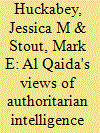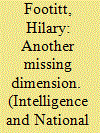| Srl | Item |
| 1 |
ID:
097156


|
|
|
|
|
| Publication |
2010.
|
| Summary/Abstract |
Al Qaida and its jihadist allies shape their plans and operations substantially in response to threats they face from authoritarian intelligence services of the Middle East. While most jihadists initially believed that victory over their 'near enemies'- so-called 'apostate' regimes - should be their top priority, the ruthlessly effective security apparatuses of their home countries were significant factors in the transition to 'global jihadism', which emphasized the fight against the 'far enemy': the United States. This article presents al Qaida's views of the region's domestic intelligence services by examining captured documents and open source materials.
|
|
|
|
|
|
|
|
|
|
|
|
|
|
|
|
| 2 |
ID:
097151


|
|
|
|
|
| Publication |
2010.
|
| Summary/Abstract |
This article argues that foreign languages are another part of the 'missing dimension' of intelligence. By examining the role of linguists in Y stations and at Bletchley Park in the Second World War, the article explores the institutional language policies developed for intelligence, and the working practices of those with foreign language skills. The article suggests that certain issues raised by this case study might be usefully examined in other intelligence contexts: the ways in which foreign language requirements are officially represented, the problematics of foreignness for recruiters, the status and identities of language workers, and the implications of professional translation practice within an intelligence environment.
|
|
|
|
|
|
|
|
|
|
|
|
|
|
|
|
| 3 |
ID:
097157


|
|
|
|
|
| Publication |
2010.
|
| Summary/Abstract |
The Peace Treaty of 1947 required Italy to renounce sovereignty over its former colonies. Italy and Britain, although NATO allies, bitterly disputed the disposition of Tripolitania and Eritrea. The Italian government sent agents to Tripoli and Asmara to influence local populations in favour of its policy of independence for both regions. The agents ran espionage operations: developing networks of agents, purloining documents, bribing officials, and channeling illegal funds to local political parties. Dr Matteo Gallimberti, the Italian agent in Tripoli, faced accusations that he was embezzling funds. After he committed suicide in January 1950, local British military authorities discovered the full range of his illegal activities. Rather than publicly embarrass the Italian government, British Foreign Office officials coerced concessions from the Italian government in exchange for keeping the potential scandal concealed. The affair demonstrates the fractious nature of Anglo-Italian relations within the framework of the NATO alliance and the respective foreign policy-making elites' differing and self-interested approaches to development and security issues in Africa.
|
|
|
|
|
|
|
|
|
|
|
|
|
|
|
|
| 4 |
ID:
097153


|
|
|
|
|
| Publication |
2010.
|
| Summary/Abstract |
This paper focuses on how pre-existing policy priorities and goals among policy elites in the US, UK, and Australia encouraged the blurring of strategic and tactical intelligence assessment as a mechanism for legitimising the Iraq invasion. Through the selective use and interpretation of sometimes vague or unsubstantiated tactical and technical intelligence and the many uncertainties it contained, proponents of the war were able to undermine existing strategic assessments on Iraq by introducing a range of possible, but largely unsubstantiated, threat scenarios as justification for military action. The paper argues that in so far as intelligence reforms are needed, they should be focused primarily on the interface between analysis and policy making, and the issue of how policy makers interpret and understand the uncertainties that intelligence assessments necessarily contain.
|
|
|
|
|
|
|
|
|
|
|
|
|
|
|
|
| 5 |
ID:
097154


|
|
|